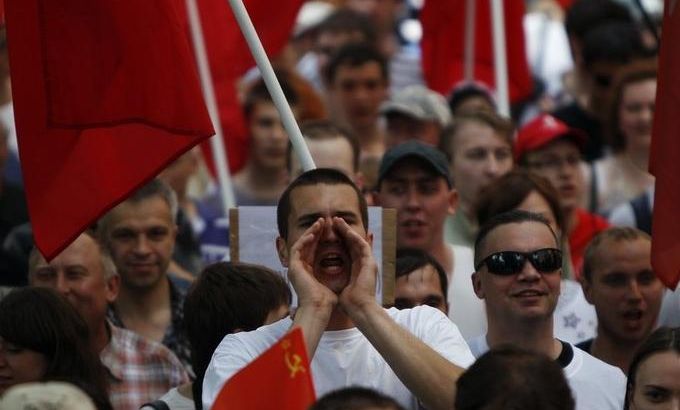
Is Russia’s democracy under threat?
We ask if the country’s traditional opposition is being marginalised in the political struggles of the new Putin era.
Russia’s parliament, known as the Duma, has passed the third reading of a bill that would label NGOs accepting international funding as “foreign agents”.
Opposition groups say the law is just the latest attempt by Vladimir Putin, Russia’s president, to stifle opponents.
Earlier this week, Russia’s parliament approved a controversial information law that empowers the government to unilaterally block websites. Some say it is a step forward in the fight against pornography, but opponents fear it is just another restriction on civil society. They say once the technology is in place to block certain sites there is nothing to stop it being used to block and censor others.
After Putin’s inauguration in May, a host of controversial laws have passed through parliament.
In early June, the Duma passed a law drastically raising fines from 50 to 9,000 US dollars for participation in unsanctioned rallies. As for the organisers of illegal protests they will be fined around $30,000.
The Duma is now considering another bill re-introduncing drastic penalties for libel: five years in jail and a fine of $15,000. Defamation was decriminalised under Dimitry Medvedev, the former Russian president.
The decriminalisation of speech offences is not the only Medvedev initiative that has come under re-examination following Putin’s return to power.
Is the traditional opposition being marginalised in the political struggles of the new Putin era?
Inside Story, with presenter Sami Zeidan, is joined by guests: Vyacheslav Nikonov, the Russian State Duma deputy, and a member of the United Russia party; Oleg Kozlovsky, the director of a pro-democracy NGO, the Vision of Tomorrow Foundation; and Julia Pettengill, the co-chair of the Russia Studies Centre, at the Henry Jackson Society.
|
“Putin is a Soviet man who thinks like a KGB agent. He genuinely doesn’t realise that there is another way of holding power other than by lies, corruption and deceit.” Lyudmila Alexeyeva, a human rights activist, Moscow Helsinki Group |
THE NEW PUTIN ERA:
- Russian parliament approved a law that can be used to censor the internet
- Russia says the law is necessary to combat child pornography
- A list with ‘harmful’ or ‘illegal’ websites will be created in November
- The law will allow the government to blacklist websites deemed to be harmful
- Activists fear that social network sites will be closed without a court order
- Facebook and twitter are used to organise the anti-government movement
- In June, the government raised the penalty for ‘illegal’ public protests from $50 to about $9,000
- A bill designating foreign NGOs as ‘foreign agents’ is currently being studied
- The new law will create a federal department to monitor the internet
- Legislators have proposed a bill to make libel a criminal offence
- Libel was downgraded to an administrative offence 6 months ago